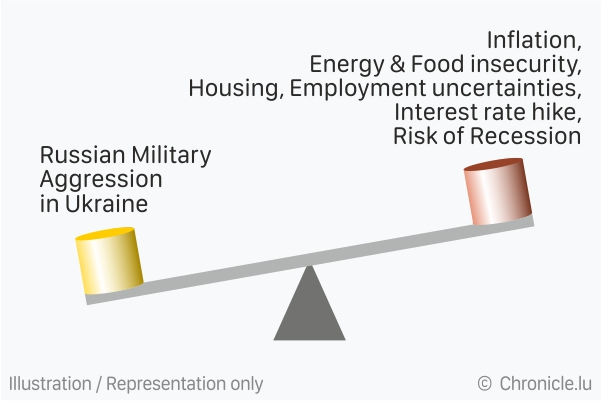
Five months into the Russian military invasion of Ukraine (since 24 February 2022), the biggest assault on a European country since World War II, worldwide food and energy prices have increased to a level prompting the United Nations (UN) to warn against an impeding global food crisis, in particular for poor countries in Africa and Asia, and also which has also resulted into tectonic shifts in geo-political stances and military alliances globally.
In retaliation to Russia's military aggression, European Union (EU) and major western economies have volleyed a range of economic sanctions against Russia (and Russian individuals), in the hope that it will cripple the Russian economy and deter it from continuing its military agenda in Ukraine.
Albeit an initial success and "shock" to the Russian economy, the coordinated and varied economic and individual sanctions has so far neither deterred Russia from its military campaign nor been able to abate Russia's main source of income, namely the revenue generated from oil and gas exports. On the contrary, supply chain disruptions has driven up global prices and causing double-digit inflation in several parts of the world.
This brings us to the fundamental question: How can the EU contain inflation and sanction Russia at the same time without tipping its own economy/ies into recession, while remaining (at least partly) dependent on Russian gas, in particular. Moreover, Russia accounts for 18% of the world's wheat exports, 14% of fertiliser exports and nearly 25% of natural gas exports; it is, to state the obvious, technically challenging to find (and replace with) alternative sources in a short time.
Inflation, commodity and energy prices
The European Commission recognises that commodity prices in the EU have been affected both directly (unavailability of agricultural land due to war, Russian blockade of Ukrainian seaports and reducing gas supplies to EU) and indirectly (through economic sanctions), without a short- to medium-term solution in sight.
The rising commodity and energy prices has caused high inflationary pressure across the EU and the European Central Bank (ECB) has stated that maintaining price stability is its primary objective.
However, the European Commission appeared to consider this as a temporary effect as it stated in its communication of 23 June 2022, that a broad-based fiscal impulse to the economy in 2023 does not appear warranted but, instead, temporary and targeted measures to households and businesses in order to mitigate the impact of the energy crisis should be provided in Member States. In its communication of 8 March 2022, the European Commission confirmed that Member States can set regulated prices for vulnerable consumers, households and micro-enterprises in order to help protect consumers. Moreover, EU Member States can also consider applying temporary tax measures on windfall profits and can exceptionally decide to capture a part of these returns for redistribution to consumers.
In a change of stance, the G7 (Group of Seven nations), the world's seven largest and most advanced economies, will try a new approach by imposing a cap on Russian oil export prices and the United States (US) announced a ban on new imports of Russian gold, in a renewed attempt to further curtail Russian export revenue.
In terms of the high inflation in the Euro area, the European Commission noted that amongst the Member States where energy represents a bigger share of the consumption basket, some are disproportionately more affected by rising energy commodity prices than others.
In its communication of 23 March 2022, the European Commission agreed that while food availability is currently not at stake in the EU, since the continent is largely self-sufficient for many agricultural products, it is a net importer of specific products, for example feed protein. This vulnerability, together with high input costs, such as fertilisers and fossil energy, is causing production challenges for farmers and risks further driving up food prices. Moreover, high input and energy costs could induce reduced yields for the next cropping season, especially for poor farmers.
The European Commission is also of the opinion that the negative impacts on agricultural commodity production in Ukraine, the prices and availability of commodities on the world market are the result of the destabilising effects of the Russian aggression against Ukraine, not of the EU sanctions.
The European Commission cautioned that it is crucial to put an end to the Russian aggression in Ukraine and to the suffering of the Ukrainian population; however, it is also crucial to avoid the consequences that a prolonged war in Ukraine would have on global food security. Sustainability of food systems, from Farm to Fork, is the only way forward to accommodate global food security in the long run, the European Commission underlined.
Housing
In addition to food and energy insecurities, housing could be a potential off-target causality of the Russian aggression in Ukraine. House prices have grown at their fastest pace in over a decade (house prices in the Euro area have grown by 40% between 2013 and 2021), outpacing wages and inflation, driven by nexus of persistent demand and supply constraints, which is now coupled with high prices and limited availability of building materials, causing further delays in housing construction projects and which may also drive house prices up further.
On the contrary, uncertain economic conditions and their negative effect on household income, persistent high inflation and tightening financing conditions may moderate house price growth in the short- to medium-term. Housing market availability and affordability is likely to witness irregular swings and regional imbalances in this context.
Employment
Employment is largely stable and most EU Member States enjoy high credit ratings, suggesting overall good and stable economic resilience. However, the debt-to-GDP ratio is slowly increasing (government borrowing is increasing) and a marginal GDP growth forecast for 2022 was announced. This, coupled with renewed supply chain disruptions and soaring energy prices, will likely sustain high commodity prices, and thus feed lingering economic uncertainty. Moreover, millions of people fleeing the war will soon search for employment in their host countries, testing social cohesion and job markets.
The European Commission agrees that the unprecedented nature and size of the shocks ushered in by the war make the baseline projections of its forecast subject to considerable uncertainty, and the balance of risks surrounding them skewed towards adverse outcomes. Risks are heavily dependent on the evolution of the war and its consequences for energy markets and commodity supplies.
Interest rates and recession risks
Generally speaking, interest rates tend to rise with increasing inflation, while the opposite is true in case of recession. The EU is experiencing increasingly high inflationary pressures, with the Euro area reporting a record high 8.1% annual inflation in May 2022. In parallel, long-term yields for government debt, which act as a benchmark for bank lending and market funding for corporations, picked further up. This suggests that markets are likely anticipating earlier than previously expected, and possibly more sizeable, rate increases by the ECB.
Looking at money market futures, it is expected that the ECB will have a first rate hike in July 2022, with more than a 1% increase priced in between now and December. However, real rates, that is the interest rate adjusted for expected inflation, have barely moved and have even declined in the short term. Over the forecast horizon, the European Commission indocated that real rates are likely to remain in negative territory for both short and long maturities.
However, in the current context of high inflation and limited wage increases (remaining well below consumer price increases), while at the same time corporate margins are being squeezed by input costs rising faster than prices, the increase in nominal rates is leading to a rise in the real-cost-of-debt for many households and corporations.
The European Commission has taken the view that the current increase in interest rates will weigh on economic activity, but in a moderate manner. While investments are usually hardest hit by higher interest rates, the full deployment of the European Commission's flagship "Recovery and Resilience Facility" programme will act as a major impulse for investment.
Inflation and risks of recession remain highly dependent on the evolution of the war, armistice and peace negotiations.









